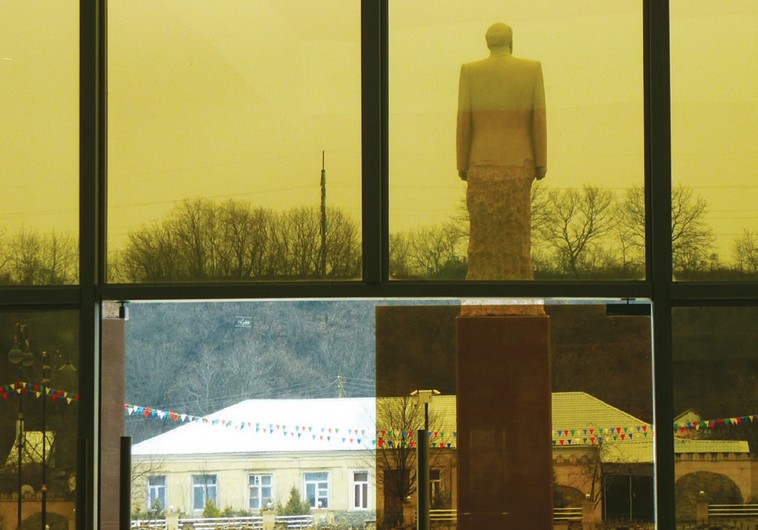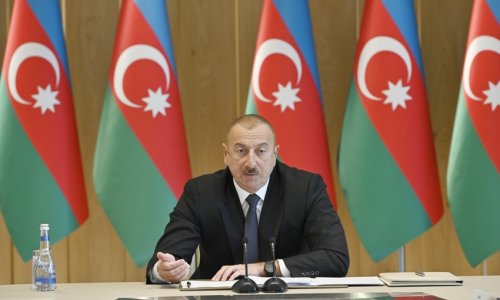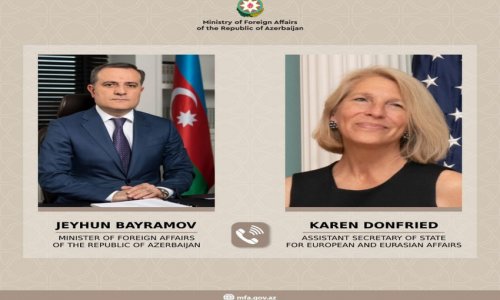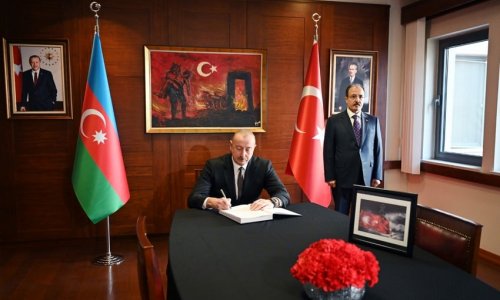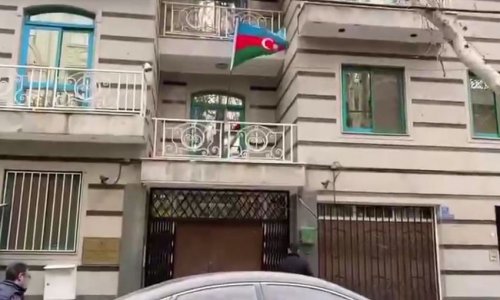Azerbaijan and Lebanon, two ountries that are seeking to expand their relations in trade and economic development, share many characteristics.
In economic terms, companies in both countries, thanks to a relatively well-developed and skilled workforce, are resilient even despite the risks related to geopolitical and security uncertainties with which they contend. There are potential market strengths to be leveraged in the energy sectors of both countries: a large natural gas deposit off the Lebanese shore and Azerbaijan’s abundant oil and gas resources along with its capacity to provide economically feasible energy transit routes to Europe and other regions. There is a robust, cosmopolitan and savvy business environment in both countries.
More broadly and significantly, the two countries have similarly diverse confessional communities representing the world’s largest faiths, even as Azerbaijan’s population is roughly double that of Lebanon.
And that’s where the critical difference between the two countries arises. Azerbaijan has avoided pragmatically the experience of Lebanon’s turbulent political problems. The government exercises great care not to allow the political risks of confessional identities to overwhelm the country’s focus on inculcating a cohesive, cogent sense of national identity among various communities of faith.
Both countries sit at identically tense crossroads where the clash of culture and civilization is being played out vigorously. However, Lebanon, which is struggling mightily to reverse the paralyzing effects of its domestic political crisis, should not hesitate to borrow a page or two from Azerbaijan’s sociopolitical playbook.
While far from perfect, Azerbaijan’s experiment with religious tolerance and cultural coexistence is unique given the contentious history of a state, once part of the former Soviet Union, that is situated in a now obscure border area between the old Ottoman and Safawid empires.
The Azerbaijani mentality of tolerance and accommodation, even with a few worrisome politically based slips, has attracted a good deal of global attention.
Just a few weeks ago, a delegation traveled to Stockholm for an international conference seeking to prove how ethnic and religious tolerance is still a viable objective in a region caught up in vicious sectarian conflicts. The Azerbaijani delegation included the country’s Muslim mufti (Sheikh-ul-Islam Allahshukur Pashazade) as well as the Russian Orthodox archbishop, the Roman Catholic nuncio and leaders of the community of Mountain Jews (Sephardic) and the Community of European Jews, as well as the government counselor for multiculturalism and religious affairs.
The various confessional groups do not shy from publicly stating their pride about Azerbaijan’s accommodations for confessional communities. In September, at a meeting in Paris also attended by Azerbaijan’s First Lady Mehriban Aliyeva, Milikh Yevdayev, representing the country’s Mountain Jews group, said, "Azerbaijan has been living and developing with its own national moral values. A little before, the respected rabbi [in Paris] said we have faced such a fact that indoors we are Jewish, outdoors French. But this is not the case in Azerbaijan. We are Jewish both indoors and outdoors. We walk with this kippa both indoors and outdoors.”
Archbishop Alexander Ishein of the Russian Orthodox Church’s Baku and Azerbaijan Eparchy echoed Yevdayev’s sentiments about his country’s unique mentality: "This is about deep respect for everyone’s religious feelings. We do not have any religious or national blocks or streets. Representatives of different peoples and nations live in the same street, same building. There are many mixed marriages in our country.”
Azerbaijan’s transformation is justifiably remarkable.
This coming year, it will celebrate the 25th anniversary of regaining its independence after the collapse of the Soviet empire. Poverty was still extremely high even a decade ago, running close to 50 percent.
Unemployment today is in the single digits and the country has generally been unaffected by the much more severe recession in Russia. Ironically, few people are able to locate the country on a map. It was an independent republic once before briefly in the 20th century, for two years after the end of World War I.
Nevertheless, there are numerous instructive takeaways for Lebanon, based on how Azerbaijan has confronted the problem of multiple, diverse and historically confrontational confessional communities.
The emphasis on confessionalism, rather than sectarianism, is more relevant here. Norms and practices that constitute confessional identities are historically rooted and politically shaped by shifting socioeconomic contexts. These norms may remain distinct but they also share a common understanding of the meaning of politics and the centrality of communal identities for Lebanon’s state and society as a constitutional entity. In its still formative stage, Azerbaijan has capitalized upon finding a shared larger norm among its vast, diverse confessional and ethnic communities.
The Azerbaijani sociocultural norm, even with some missteps in sustaining the intent, welcomes the prospects of shared governance and the project of political sovereignty, which is propelled by the mutual will of separate communities to coexist effectively and productively. In an imperfect yet effectively pragmatic way, Azerbaijani confessional communities share a worthy objective regarding how politics could be carried out in a rational, reasonable, functioning society. And it can enlighten others regarding how political power can be deployed responsibly and respectfully, even in a system defined largely by a presidency with strong, if not autocratic, powers.
Azerbaijan, like Lebanon, faces the same tensions of inflammable regional rivalries but has found a relatively low-key diplomatic way to not allow those rivalries to reshape or twist its domestic politics of accommodation and tolerance. Indeed, for Lebanon, it would be illuminating to examine more closely those local Lebanese confessional groups who bring and even entice regional intervention into Lebanese domestic politics as a way of bolstering their own position vis-à-vis other confessional communities.
The current regional crisis is being used by confessional groups, especially Shi’ites and Sunnis, to justify any move toward consolidating institutions and making key decisions about the economy and the military. There is no probability of agreement, and the state remains mired as an ineffective entity.
Yet, the Lebanese elite also would put the blame on regional developments to excuse themselves from having to do their job.
In Lebanon, the consensus among the elite of these confessional communities tends toward the theme of "blame the foreigners,” never taking responsibility upon themselves and failing repeatedly to make crucial compromises.
The sitting parliament, with an extended term lasting until 2017, is further undermining people’s faith in politics and state institutions. Lebanese citizens have once again been denied their right to elect their own officials, as the parliament acts to buffer itself and continue operating as an unaccountable, corrupt institution. It is a major mistake to interpret the failure or marginalization of Lebanese political institutions as a result of regional intervention only.
Unfortunately, local politicians do not risk elections because they worry about losing their powerful positions. They are deeply entrenched in their positions, ready to use the excuse of external conflicts (most notably, Syria and Islamic State) to protect their narrowly defined communal interests.
Due to this stalemate, Lebanon’s economy is mired in a mess that is becoming increasingly chaotic, and two of the country’s most historically prized industry sectors – tourism and investment – are suffering extensively as a result of the lingering political instabilities.
The paralysis is hurting in major ways: the country has been unable to agree over how to handle offshore gas supplies that are being exploited by Israel now and, in fact, Israel is already exporting gas from the same area.
Likewise, the closing last summer of the Naameh landfill in Beirut underscores a weakened public services infrastructure. The "You Stink” protest campaign, organized independently of the country’s confessional communities, has been a widely publicized statement on how corruption and clientelism have strangled a government’s most elementary capacity to fulfill public service needs.
It is never easy to establish a functioning democracy in divided societies. The two key components for a functioning power-sharing arrangement are executive power-sharing and group autonomy. Confessional conflict could be accommodated by constitutional design in institutional power-sharing and communal autonomy. Power-sharing and communal autonomy require the deliberate efforts of elites to prevent the mobilization of confessional groups that would radicalize the communal boundaries and take pressure away from the state.
A successful democracy in divided societies requires a culture of accommodation and tolerance. Hence, the lesson of Azerbaijan, a dominant party republic with a strong presidency. If Lebanon is to have any chance of exercising influence as a consociational democracy in the region, it will need to adapt the strategies and tactics of the Azerbaijani experiment.
And, as relations continue to warm on several fronts between the two countries, perhaps each will become the right sort of empathetic state colleague who can help tilt the regional axis toward the difficult yet necessary model of accommodation and tolerance.
Indeed, there is the historical basis for Azeris and the Lebanese as enlightened gatekeepers open to new ideas, groups and confessional communities.
(The Jerusalem Post)
www.ann.az
Follow us !

